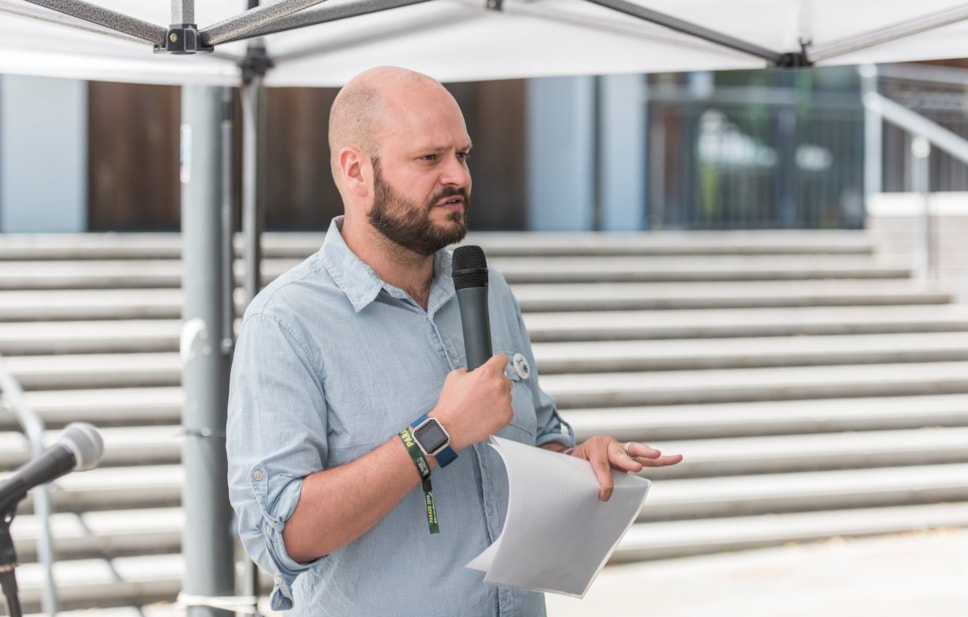
‘Centralising power and riding roughshod over local democracy’ – Mayor responds to Queen’s Speech
In the Houses of Parliament this afternoon, Her Majesty the Queen delivered the Queen’s Speech, outlining the new Government’s agenda for the next parliamentary session.
The speech contained 30 bills – pieces of proposed legislation – on topics including planning, policing, skills and further education, the environment and adult social care.
Philip Glanville, Mayor of Hackney, responds to the speech.
Planning and housing
House prices in Hackney have risen by over 71% over the past five years and are among the highest in the country, while there are more than 3,000 homeless families living in temporary accommodation. It is essential that genuinely affordable social rent and intermediate housing are prioritised for delivery in the borough. Permitted Development Rights – which give automatic permission to convert some types of buildings into housing – have not delivered any genuinely affordable or social housing.
The Council has previously responded to Government consultations on the future of the planning system in England and has submitted evidence to inquiries on this as well as on Permitted Development Rights. Its responses have urged the government to support the current role of local authorities in developing their own Local Plans that are based on clear and strong evidence supported by meaningful engagement with local communities and stakeholders. This results in high-quality development that meets the needs of residents and ensures a mixed tenure supply of new homes, and balanced and considered interventions for the development of neighbourhoods and town centres. The Council will continue to make this case
The Council’s #BetterRenting campaign has long called for a fairer deal for those in Hackney’s 32,000 privately rented properties – including the abolition of ‘Section 21’ no-fault evictions, reform to the deposit system and a national database of rogue landlords. The Renters’ Reform Bill, which has been repeatedly delayed, should be brought forward as soon as possible following the Government’s White Paper in the autumn.
Skills and post-16 education
Since 2017, over 150 Hackney residents and school leavers have started apprenticeships with Hackney Council. Currently, over 100 apprentices are directly employed by the Council, with an additional 125 members of existing staff studying level-funded qualifications, and a further 32 apprentices at schools. All Council apprentices earn at least the London Living Wage (£10.85 per hour). Hackney Council was named the Top Public Sector Employer at the School Leaver Awards 2018 and 2019, and Large Employer of the Year for London at the National Apprenticeship Awards 2019. Visit the Apprenticeship Programme Website to learn more, or hear from apprentices in their own words on the Apprenticeship Blog.
Previously the Council has written to the Government calling for greater flexibility in the apprenticeship levy in order to boost the number of apprenticeships the Council can deliver and encourage more businesses to take on apprentices as well. It is concerning that since the introduction of the Government’s apprenticeship levy, there has been a 30% decline in the number of people starting apprenticeships across London.
The Council is using opportunities such as the Kickstart Scheme to fund at least 150 local work placements for Hackney’s young people across council services and local employers, through the Council’s in-house Employment & Skills Team. All of this has been achieved against a national backdrop of a £1billion funding gap in further education since 2010.
Environment
The Council has previously submitted evidence to Parliament, calling for the Environment Bill to include measures to make sure big corporate producers and brands that sell or produce goods in plastic packaging pick up the bill for the waste they cause, as well as devolution of powers and resources to tackle the climate emergency. The Council is committed to reaching net zero emissions by 2040 and has set out some of the most robust action of any local authority in the country to do this.
Over the last year, the Council’s Rebuilding a Greener Hackney programme has demonstrated the positive environmental impact local authorities can have, working directly with local people.
The Council will continue to call for further devolution in the run-up to the UN Climate Change Conference COP26 in November.
Economic recovery after Covid-19
Hackney is well known for its thriving and dynamic creative, technology, arts and cultural sectors and for its retail, service, leisure and hospitality sectors. The borough is home to a significant and thriving small and medium sized business community, it is home to Tech City and a place where businesses start up, scale up and trade alongside and with established large international companies. In 2018, there were 21,000 businesses in Hackney, of which around 19,000 were classed as micro businesses with less than 10 members of staff.
It is also estimated that around 25,000 Hackney residents are self-employed - equivalent to 1 in 6 Hackney workers. The Council recognises that self-employed workers are particularly vulnerable to the economic impact of Covid-19, as they are not currently eligible for Statutory Sick Pay and their businesses are likely to lose trade.
It is very clear that Hackney’s local businesses are struggling at this time and a COVID-19 Business Survey (conducted in April 2020) of over 200 businesses found that in Hackney:
- 95 % of businesses reported that their business had lost income,
- 25% of businesses reported that staff were self isolating and unable to work,
- 15% of businesses reported that they had either made staff redundant or cut staff hours,
- 7.5% of businesses reported that they had staff were scared to work because of infection risk,
- 4% of businesses reported that they had furloughed staff.
The Council has submitted evidence to government inquiries on the impact of Covid-19 on the Charity Sector, businesses and workers, and the Culture Sector. As of March 2021, the Council had approved £175million in grants and reliefs for businesses in Hackney.
Today’s announcements have finally revealed what the Government’s levelling up agenda means in practice – centralising power in Whitehall and riding roughshod over local democracy.
Ministers want to remove our residents’ right to have a say on new developments in their neighbourhood, make it harder for them to vote, and limit their right to protest.
Forcing voters to produce photo ID at polling stations will disenfranchise residents without a passport or driving licence, disproportionately affecting young and elderly people and those on lower incomes. It is a solution to a problem that simply does not exist.
At the same time, they want developers to receive an automatic right to planning permission without proper local scrutiny – four years on from the Grenfell Tower tragedy which has left hundreds of leaseholders in Hackney facing eye-watering bills because of the Government’s failure to grip fire safety. This is at a time when residents' concern and scrutiny around the design, affordability, location and sustainability of new homes is increasing. We also can’t afford to see vital parts of our high streets and commercial spaces lost to poor quality, but still unaffordable, residential development.
We note with caution that the Government has – despite repeatedly pledging to ban no-fault Section 21 evictions for renters – only committed to publishing its response to consultation later this year rather than publishing a bill. Its White Paper must not water down its promise to the thousands of private renters in Hackney to give them better security and regulation.
As we build a fair recovery from the pandemic, it’s vital that we provide the opportunity for those that have lost work to retrain and reskill, and for our young people to get on the career ladder. While we cautiously welcome this focus and will study the detail of the Skills and Post-16 Education Bill, the Government must restore funding to our further education sector, invest in green skills and ensure this Bill leads to a greater devolution of powers.
While we’ve been rebuilding a greener Hackney, the Government has been sitting on its Environment Bill for years. It’s vital that it devolves further powers and funding to councils like Hackney so we can take the radical action needed to respond to the climate emergency – and make the UK a world leader in reaching net-zero emissions in the run-up to COP26 in November.
Similarly, it’s time for ministers to deliver on their longstanding promise to reform adult social care, and provide local authorities with the funding they need to provide the frontline services residents deserve.
Over the last year, councils have shown that they know their communities best – innovating to quickly create new services to keep residents safe, with the local knowledge needed to design and deliver public services. The Government talks a good game on devolution – it’s time it ended central command and control and devolved the powers and resources to let us rebuild a better Hackney.Philip Glanville, Mayor of Hackney
